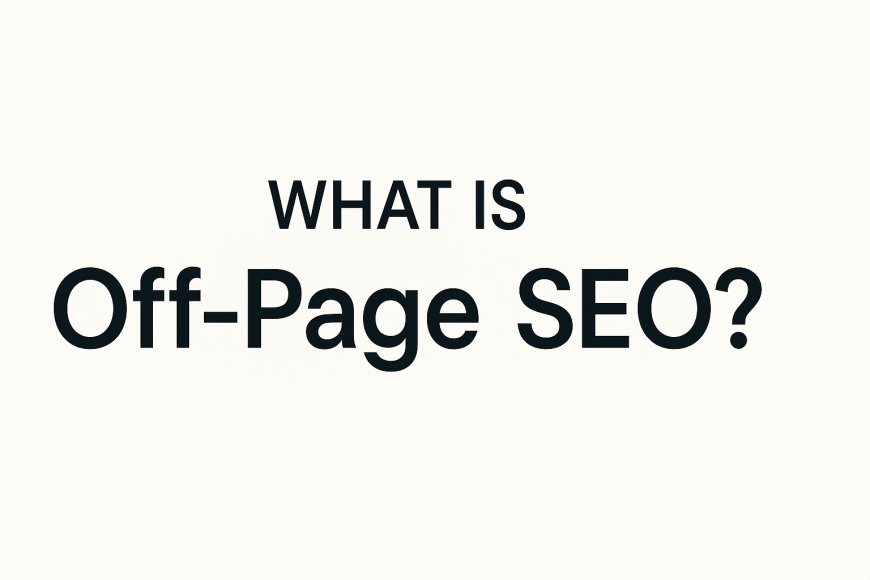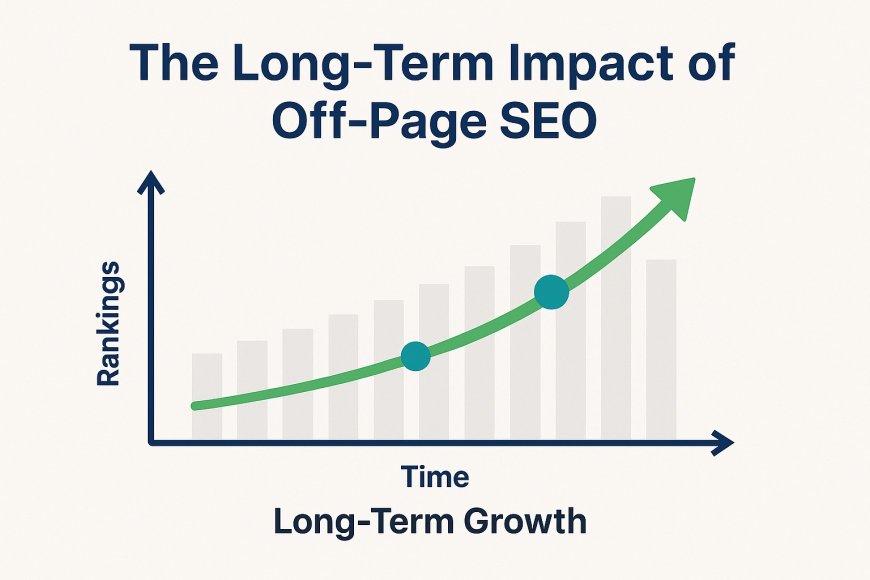What Is Off Page SEO and Why Does It Matter for Your Website
This article explains the concept and importance of off-page SEO, which involves all activities performed outside your website to improve its search engine rankings. Key elements include backlink building, social media engagement, guest blogging, and brand mentions. Off-page SEO boosts domain authority, trust, visibility, and organic traffic. The article also highlights common mistakes to avoid and emphasizes the long-term benefits of building a strong off-page SEO strategy to enhance your website's credibility and search performance.

In the ever-evolving world of digital marketing, search engine optimization (SEO) remains a cornerstone for driving organic traffic to websites. While on-page SEO focuses on optimizing elements within your website, such as content and meta tags, there’s another critical aspect that happens outside your site’s boundaries. This external strategy, known as off-page SEO, plays a pivotal role in establishing your website’s authority, credibility, and visibility in search engine results. By leveraging off-page techniques, businesses can enhance their online presence and compete effectively in the digital landscape. In this article, we’ll explore what off-page SEO entails, its key components, why it matters, and how you can implement it to boost your website’s rankings with a focus on off-page SEO.

Understanding Off-Page SEO
Off-page SEO refers to all the activities performed outside your website to improve its search engine rankings. Unlike on-page SEO, which deals with internal elements like keywords, content quality, and site structure, off-page SEO focuses on building your website’s reputation and authority in the eyes of search engines like Google. The primary goal is to demonstrate to search engines that your site is trustworthy, relevant, and valuable through external signals. These signals include backlinks, social media engagement, brand mentions, and other factors that indicate your site’s popularity and credibility. By cultivating a strong off-page presence, you signal to search engines that your website is a reliable source of information, which can significantly impact your rankings.
Link building, a cornerstone of off-page SEO, is one of the most influential factors in this strategy. When reputable websites link back to your content, it acts as a vote of confidence, signaling to search engines that your site is authoritative. However, not all backlinks are created equal—quality matters more than quantity. For instance, a single link from a high-authority site like a well-known blog or news outlet carries more weight than dozens of links from low-quality or spammy sites. Other off-page activities, such as social media marketing, influencer collaborations, and guest blogging, also contribute to building your brand’s online reputation. These efforts collectively enhance your site’s trustworthiness, making link building a critical LSI keyword to understand in the context of off-page SEO.
Why Off-Page SEO Matters
Off-page SEO is vital because it directly influences how search engines perceive your website’s authority and relevance. Search engines like Google use complex algorithms to rank websites, and off-page factors account for a significant portion of these algorithms. For example, Google’s PageRank algorithm evaluates the quantity and quality of backlinks pointing to your site to determine its authority. A website with numerous high-quality backlinks is more likely to rank higher than one with few or low-quality links. Moreover, off-page SEO helps establish your brand’s credibility, fosters trust among users, and drives referral traffic from external sources.
Beyond rankings, off-page SEO enhances your brand’s visibility across the internet. When your website is mentioned on social media, featured in guest posts, or linked by authoritative sites, it exposes your brand to new audiences. This increased exposure can lead to higher traffic, more leads, and ultimately, better conversions. Additionally, off-page SEO contributes to building relationships within your industry. Collaborating with influencers, engaging with your audience on social platforms, and earning mentions from reputable sources all strengthen your brand’s network and reputation.
“Off-page SEO is like building a digital reputation—every link, mention, and interaction is a vote of confidence that tells search engines your website is worth ranking.”
– Digital Marketing Expert
Key Components of Off-Page SEO
To implement an effective off-page SEO strategy, you need to focus on several key components. Below is a breakdown of the most critical elements:
1. Backlink Building
Backlinks are the backbone of off-page SEO. They act as endorsements from other websites, signaling to search engines that your content is valuable. Strategies for building backlinks include guest blogging, outreach to industry websites, creating shareable content like infographics, and listing your site in reputable directories. However, prioritize quality over quantity—links from authoritative, relevant sites are far more valuable than numerous low-quality links.
2. Social Media Engagement
Social media platforms are powerful tools for promoting your content and engaging with your audience. Sharing your blog posts, videos, or infographics on platforms like Twitter, LinkedIn, and Instagram can drive traffic and increase brand visibility. While social signals (likes, shares, comments) may not directly impact rankings, they amplify your content’s reach and encourage others to link to it.
3. Brand Mentions
Unlinked brand mentions, where your website or brand is referenced without a direct link, also contribute to off-page SEO. Search engines can recognize these mentions as indicators of your brand’s prominence. Encourage mentions by engaging with your audience, participating in industry discussions, and creating noteworthy content that others naturally reference.
4. Influencer Marketing
Collaborating with influencers in your niche can boost your off-page SEO efforts. Influencers can share your content, link to your website, or mention your brand to their followers, increasing your reach and credibility. Choose influencers whose audience aligns with your target market for maximum impact.
5. Online Reviews and Reputation Management
Positive reviews on platforms like Google My Business, Yelp, or industry-specific directories can enhance your credibility. Encourage satisfied customers to leave reviews and respond professionally to feedback to build trust. A strong online reputation signals to search engines that your brand is reliable.
Table: Off-Page SEO Strategies and Their Benefits
|
Strategy |
Description |
Benefits |
|
Backlink Building |
Acquiring links from authoritative websites to your content. |
Improves domain authority, drives referral traffic, boosts rankings. |
|
Social Media Engagement |
Sharing content and interacting with audiences on social platforms. |
Increases brand visibility, encourages content sharing, drives traffic. |
|
Brand Mentions |
Earning mentions of your brand or website across the web, even without links. |
Enhances brand recognition, signals relevance to search engines. |
|
Influencer Marketing |
Partnering with influencers to promote your content or brand. |
Expands reach, builds credibility, attracts new audiences. |
|
Online Reviews |
Encouraging and managing customer reviews on third-party platforms. |
Builds trust, improves local SEO, enhances brand reputation. |
How to Implement an Effective Off-Page SEO Strategy
To leverage off-page SEO effectively, follow these actionable steps:
-
Create High-Quality Content: Content is the foundation of off-page SEO. Produce valuable, shareable content like blog posts, infographics, or videos that others naturally want to link to or share. For example, a well-researched industry report can attract backlinks from authoritative sites.
-
Build Relationships: Network with bloggers, journalists, and influencers in your industry. Reach out to them with personalized pitches for guest posts or collaborations. Building genuine relationships increases the likelihood of earning high-quality backlinks.
-
Leverage Social Media: Actively promote your content on social media platforms. Engage with your audience by responding to comments, joining discussions, and sharing user-generated content. This amplifies your reach and encourages others to reference your brand.
-
Monitor Your Backlinks: Use tools like Ahrefs, Moz, or SEMrush to track your backlink profile. Identify and disavow low-quality or toxic links that could harm your rankings. Focus on acquiring links from reputable, relevant websites.
-
Encourage Reviews and Mentions: Ask satisfied customers to leave reviews on platforms like Google My Business. Participate in industry forums, podcasts, or webinars to earn brand mentions and establish thought leadership.
Common Mistakes to Avoid
While off-page SEO is powerful, certain pitfalls can undermine your efforts. Avoid buying low-quality backlinks, as they can lead to penalties from search engines. Similarly, don’t rely solely on one strategy, such as link building—diversify your efforts across social media, influencer marketing, and reputation management. Finally, steer clear of spammy tactics like comment spam or excessive link exchanges, as these can damage your site’s credibility.

The Long-Term Impact of Off-Page SEO
Investing in Backlink building is a long-term strategy that yields sustainable results. By building a robust network of backlinks, fostering social media engagement, and earning brand mentions, you create a strong digital footprint that search engines reward. Over time, these efforts translate into higher rankings, increased traffic, and a more authoritative online presence. Unlike paid advertising, which stops delivering results once the budget runs out, off-page SEO builds a foundation that continues to drive organic growth.
In conclusion, off-page SEO is an indispensable part of any comprehensive digital marketing strategy. By focusing on building high-quality backlinks, engaging with audiences on social media, earning brand mentions, and managing your online reputation, you can significantly enhance your website’s visibility and authority. Start implementing these strategies today to unlock the full potential of off-page SEO and propel your website to the top of search engine results.






























































































































































